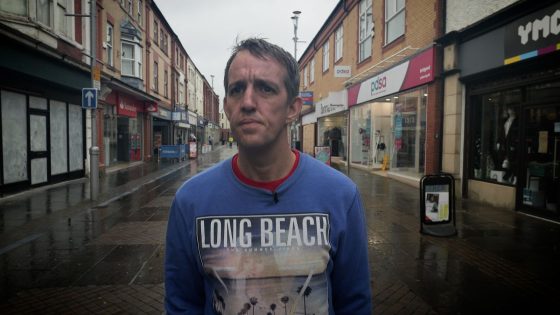“If it gets much colder, I am thinking of doing something, just to go back to prison,” says Leon Lear, 43, as he sits next to the remnants of his failed fire on the edge of a playground in Bridgend, South Wales.
The wood was too damp to burn; the only ash is from cardboard from a nearby recycling bin. A damp sleeping bag hangs over the railings.
Leon is on early release from jail, but he’d rather have stayed in. He says instead of celebrating he began to get anxious as his release date approached, knowing he would be homeless and that the outside meant literally that – outside.
He says: “Because I was released five weeks early, the probation, and housing didn’t have an inkling I was going to be released. They told me that I’d be on a waiting list for housing. So, since then, I’ve been living on the streets.”
Leon was jailed for affray in June this year, released five weeks early but homeless in July. He was recalled on breach of licence for shoplifting in September and released again two weeks ago. How much longer before he is back inside?
He is one of 13% of prisoners in England and Wales who are released without a home and the chief inspector of probation says homelessness is the biggest driving factor for people reoffending or breaching their licence.
Recalled prisoners are the fastest-growing element of our overcrowded prison population, doubling in a decade.
Leon is wearing two t-shirts that he stole that morning. He says he’s not proud of it but it’s what he must do to survive. “I don’t even have underwear,” he says, “I know it’s embarrassing, but this is how I got to live.”
His only possessions are a toothbrush and toothpaste in the pocket of a tracksuit given to him by a local charity.
For a while, he bunked down with some heroin addicts, but that got him back on the drug after three years clean. So now he is on the streets and makes a daily trip to the drug clinic for methadone, to keep him off the habit.
“I’ve done a winter [homeless] before and it’s horrific,” he says. “Last night I was thinking of smashing a window or acting drunk, just to go to the police station to get a hot meal in on the blanket to stay somewhere safe. I’d rather be in jail than live like this much longer.”
Read more:
Thousands of NHS porters and cleaners not given COVID bonuses
Police ‘in denial’ after probe into officers acting above law
How one image led to girl, 11, becoming sex abuse victim
That’s despite the fact he describes prison as being locked up 23 hours a day with mice in his cell.
Leon visits an outreach centre in town called BARC. As well as hot drinks and meals, they provide clothes, tents and help with doctors’ appointments and courses.
Demand for the services here has doubled in a year – a lot due to the early release scheme.
Founder Becky Lloyd, 45, says: “A lot of these guys are re-offending deliberately now to go back to prison because they’ve got nowhere to go. At least if we can try and support them, we can try and avoid that. But the winter is coming, they don’t want to be in a tent. They’d rather be in jail.”
We meet another man just out on early release who has been living in a tent for the last three weeks.
He told us: “It’s harder out here than being in there [prison]. Because you’ve got three meals a day in there and a roof over your head. Out here, you’ve got to come to places like this to get fed, you know, beg, borrow or steal.”
The centre relies on donations and much of the work is self-funded by Becky and co-founder Teresa Wilkie. While it seems a somewhat hopeless endeavour, success is personified by one of the workers.
Ffion Evans, 25, was on crack for three years and heroin for seven. When released from jail in December last year, she became homeless and turned back to her addiction. But when she became pregnant, she managed to turn her life around.
Wearing a T-shirt with the words “actually, I can”, she says: “I started coming here, they supported me and showed me I’m worth it and I can do it.
“Now I’ve been clean for months, I’m a support volunteer worker so I’ve got a career ahead of me. It’s brilliant. This is the best version of me I have ever been. I couldn’t have done it without these lot.”
The chief inspector of probation, Martin Jones, told Sky News: “What we know is that if people do not have a safe accommodation at the point of release, they are more likely to be recalled to custody as a result of breaching their licence conditions or indeed to re-offend. I think it [providing a home] is probably the most critically important part of a prisoner’s release.”
Tom Hollick from The Wallich, which offers council-funded support for the homeless in Bridgend, said: “There’s over 11,000 people, in the latest data across the whole of Wales, who are in temporary accommodation with more people presenting all the time.
“So, it’s kind of that bottleneck in the system, and people coming out of prison are adding to the existing crisis.”
A Ministry of Justice Spokesperson said: “The new government inherited a justice system in crisis, with levels of homelessness which were far too high and an early release scheme that did not give probation staff enough time to get prisoners ready for their release.
“Our new system allows staff to better prepare offenders for life after prison and we are working with partners, including local councils and charities, to avoid them being released onto the street.”
Source Agencies






